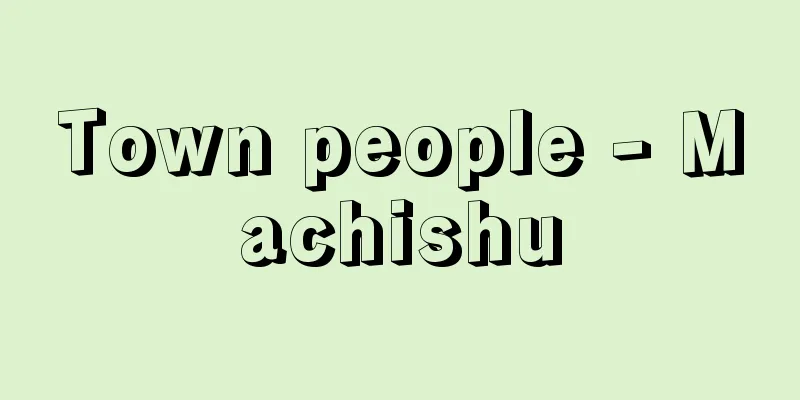Town people - Machishu

〘 noun 〙 (also "machishu") 1. Town people. Merchants and craftsmen who live in towns. This refers to people who lived in local autonomous communities in the late Middle Ages in towns in Kyoto, Katata in Omi Province, Hirano in Settsu Province, and Sakai in Izumi Province, and were culturally and economically active. In Kyoto, a wide range of people, including usurers such as sake merchants and dokura, lower-ranking samurai and nobles, organized machigumi, ran town affairs centering on monthly events, and carried out events such as the Gion Festival. They were also fond of renga (linked verse), Noh, and tea ceremony, and many were followers of the Nichiren sect. Choshu. *Ishiyama Honganji Diary - Shishinki, Tenbun 4 (1535), September 3, "The townspeople were ordered to sign the petition together, and so on." 2. Town officials such as elders and five-man groups in Kyoto and Osaka during the Edo period. Town. Choshu. ※Ukiyo-zoshi: The Appearance of a Girl from the World (1717) vol. 1: "A sudden meeting is made, and the townspeople gather at the meeting hall."Cho-shu -chau... [townspeople]Source: The Selected Edition of the Japanese Language Dictionary About the Selected Edition of the Japanese Language Dictionary Information |
〘名〙 (「まちしゅ」とも)① 町の人々。町に居住する商人や手工業者。特に、中世末、京都の町々や近江国堅田・摂津国平野・和泉国堺などで地域的に自治的な生活共同体を営み、文化的・経済的に活発な動きをした人々をいう。京都では酒屋土倉などの高利貸業者、下級の武士・公家を含む広汎な層が町組を組織して、月行事を中心に町政を運営し、祇園祭などの行事を執行した。また連歌・能・茶湯などに親しみ、法華宗の信者が多かった。ちょうしゅ。※石山本願寺日記‐私心記・天文四年(1535)九月三日「依二通路之儀一、町衆連署させらると云々」② 江戸時代、京都・大坂などで、年寄や五人組などの町役人。町。ちょうしゅ。※浮世草子・世間娘容気(1717)一「俄に寄会ふれさせ、会所へ町衆あつまり」
ちょう‐しゅ チャウ‥【町衆】出典 精選版 日本国語大辞典精選版 日本国語大辞典について 情報 |
Recommend
Codium divaricatum
… [Reiko Nagata]. … *Some of the terminology that...
al-Jabel al-Akhdal
…[Editorial Department]. … *Some of the terminolo...
Tomis
...It has an elevation of 31m, an average annual ...
Karakasagayatsuri - Karakasagayatsuri
…Because most of Egypt is desert and trees are sc...
Ishimochi (Argyrosomus argentatus) - Ishimochi (English spelling)
A marine fish of the family Sciaenidae in the orde...
Tactics - Senpo
〘noun〙 A way of fighting. A method for dealing wit...
Ethanoic acid (English spelling)
Another name for acetic acid. A systematic name t...
Isin 1st Dynasty - Isin 1st Dynasty
…the capital of the Isin I dynasty (2017-1794 BC)...
Satyricon
A Roman novel said to be written by Petronius. It ...
Watsonia
Also known as Gladiolus glabra. A genus of the Iri...
Bayberry - Japanese bayberry
A tall tree of the Myricaceae family (APG classif...
Arboretum - Arboretum
… These trees are classified as evergreen or deci...
Espostoa lanata (English spelling) Espostoalanata
...First of all, this family includes the largest...
Circular function
〘 noun 〙 Trigonometric functions. [Engineering Voc...
Blalock, A.
…Surgical treatment of the heart was first perfor...









![Itano [town] - Itano](/upload/images/67caebbc914c8.webp)